Keresés: %s
Keresés: %s
Employment, Social Policy, Health and Consumer Affairs Council, 14 March 2022
In times of particular concerns over the situation in Ukraine, social and employment ministers had their meeting within the EPSCO Council on 14 March 2022, discussing several issues. Ministers reached a general approach on the women on company board directive. Policy debates took place about the crisis in Ukraine, combating discrimination in recruitment and fostering full participation by older people. Council conclusions related to employment and the European Semester have been also approved.
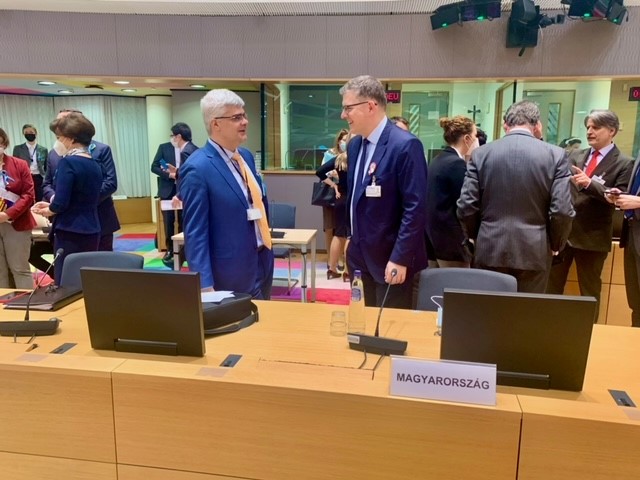
The specific situation in Ukraine incited the ministers to welcome and to have an exchange of view over the very recent Commission proposal on the Cohesion Action for Refugees in Europe. The situation in Eastern Europe being alarming and at the very heart of actual European common thinking, the ministers paid further attention to Ukraine, the lunch discussion being dedicated to investigate what measures belonging to their respective competences may ensure to effectively deal with employment and social issues arising from recent evolvements.
The Council reached a general approach regarding the women on company board directive, a dossier that has been in the focus for very long years without considerable developments. Hungary underlined that initiatives to promote equal opportunities and equal treatment between women and men to be of utmost importance, and therefore generally supports the aim of the draft directive to strengthen women's participation at all levels of decision-making, including in the economic sphere. Nevertheless, Hungary continues to believe that the most appropriate way to achieve these targets are through national initiatives with a bottom-up approach as opposed to binding, quantitative quotas. Although there was a considerable progress regarding the text through the negotiations, Hungary believes that there would have been further room for improvement in the draft in order to take better into account the principles of subsidiarity, proportionality and the proper consideration of the different company and corporate laws of EU Member States. Hungary considers it extremely important to support the empowerment of women, therefore Hungary abstained and issued a national statement.
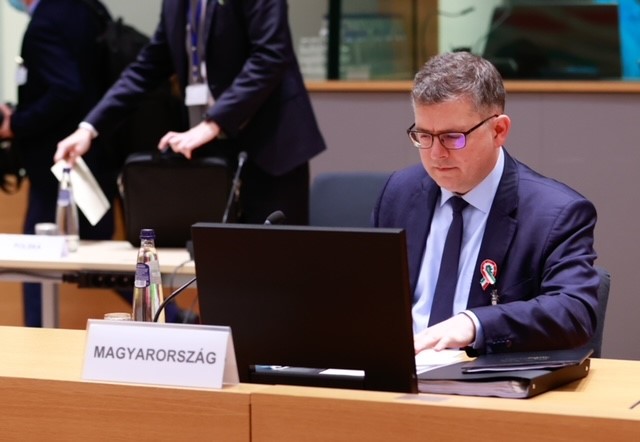
The ministers held a constructive policy debate on the matter related to combating discrimination in recruitment and promoting diversity in the world of work focusing on discovering ways to ensure level playing fields for all workers regardless to their personal circumstances. Senior citizens face multifaceted challenges regarding the area of employment, accordingly, as a good continuation to the previous topic, the ministers – in the context of another policy debate – discussed initiatives to foster full participation by older people in the labour market.
As any other business points, the Council has had information on the Annual report on equality between women and men, also the implementation of the EU Anti-racism action plan. Concerning the European Pillar of Social Rights Action Plan, the current status of national goals for employment, skills and poverty, furthermore the first year of the European Child Guarantee have been observed.
Environmental Ministers discussed the Fit for 55 package, deforestation-free products, while also adopted their position on batteries
The first Environment Council of the French Presidency was held on 17th March 2022.
At the first part of the meeting, ministers exchanged their views on the climate policy elements of the ambitious ‘Fit for 55’ package. The extension of EU Emission Trading System to buildings and road transport sector and the Social Climate Fund, which aims to reduce the negative socio-economic effects of this extension, received special attention during the negotiations, as Member States continue to be largely divided on both issues. For Hungary, introducing an EU-wide common carbon price for residential sectors is still a red-line. We need to protect our citizens and families from bearing the excessive burden of transition.
The Member States unanimously supported the general approach on the Regulation on Batteries and thus agreed to the launch of the negotiations with the European Parliament. The Regulation not only aims to facilitate the transition to the circular economy and electromobility, but also contributes to achieving the European climate targets. Moreover, it also plays a major role in the protection, preservation and improvement of the quality of the environment by minimising the negative impact of batteries and accumulators and waste batteries and accumulators.
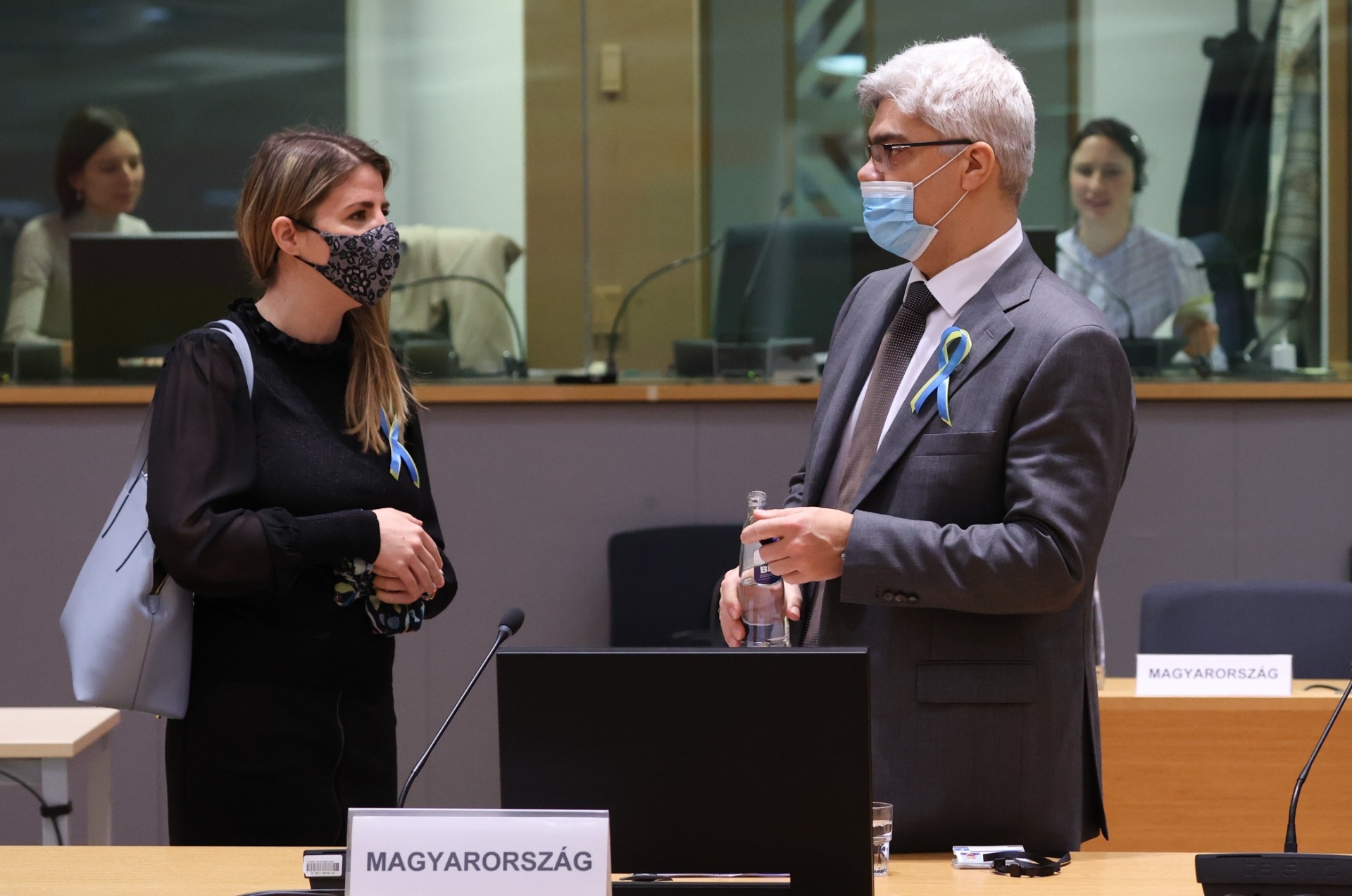
Environment ministers endorsed the Council’s mandate to negotiate an agreement with the European Parliament on a Regulation that aims to further restrict the presence of persistent organic pollutants (POPs) in waste. It is of utmost importance in the progress towards an
Ministers agreed that minimising the risk of deforestation and forest degradation is a key priority, and supported the principle of due diligence. At the same time, they also expressed concerns about the possible impact on implementation. In general, Member States recalled the importance of subsidiarity and simplification during the debate and urged the revision of the definitions.
The impact of the war in Ukraine was at the focus of the March AgriFish Council
Agriculture ministers exchanged views on agri-food market situation, the approval process of CAP strategic plans, the importance of plant-based proteins, Geographical Indications (GIs), phytosanitary issues and several other matters during the Agriculture and Fisheries Council, held on the 21th of March in Brussels.
As regards the market situation in the wake of the invasion of Ukraine, agriculture ministers expressed their solidarity to minister Roman Leshchenko, who participated online during this debate. Most have highlighted the food security as key priority and broadly supported the proposed crisis response measures by the Commission.
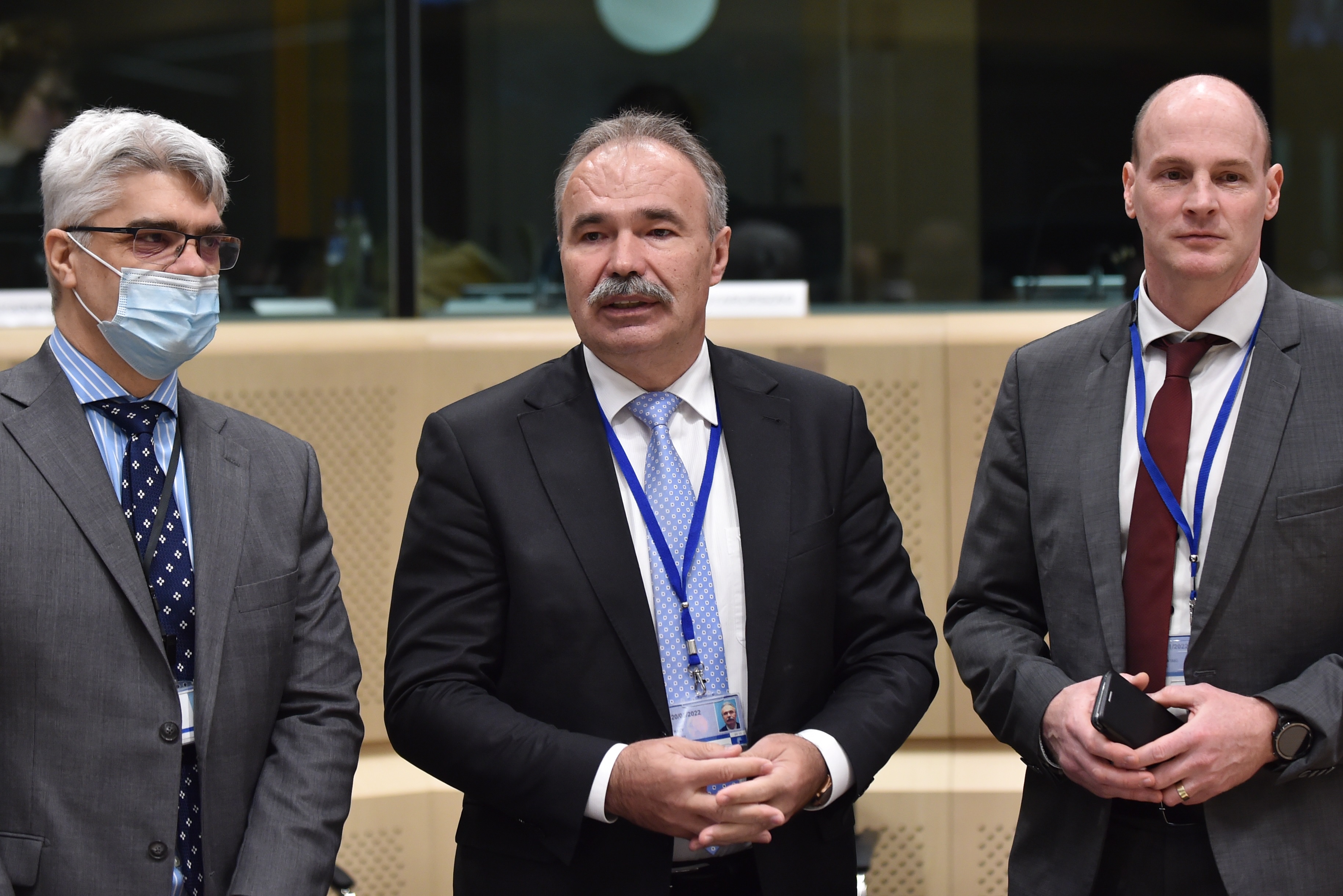
About the approval procedure of the CAP Strategic Plans, Minister István Nagy asked flexibility from the Commission and highlighted that the current crisis situation should be also taken into consideration. Hungary presented the common declaration of the Visegrád Group, Bulgaria, Croatia, Romania, and Slovenia, calling for swift adoption of the Plans.
Regarding the revision of the Geographical Indications regulation, 15 Member States – including Hungary – drew the attention to the evaluation of the dossiers, the sustainability aspects, the role of producers associations and the adjustment of the official control system.
Vast majority of delegations – including Hungary – agreed on the need to develop an EU plant protein strategy.
Member States raised their concerns about the review of the legislation on the sustainable use of plant protection products. Ministers stressed that reduction targets should not lead to a decrease in agricultural production. Minister István Nagy emphasized that we are committed to achieving the EU objectives set out in the Farm to Fork Strategy, however different starting points of the Member States should to be taken into account.
Further topics included G7 extraordinary Agriculture Ministers’ Meeting, alternatives to plant protection products, fertilizer prices and the effects on the fisheries sector of rising fuel prices.
General Affairs Council, 22 March 2022, Brussels
At the General Affairs Council meeting on 22 March 2022, Hungary was represented by Minister Judit Varga. The Council was chaired by Clément Beaune, French Secretary of State for EU Affairs, and the Commission was represented by Vice-Presidents Dubravka Šuica and Maroš Šefčovič.
Preparation of the European Council on 24-25 March 2022
The General Affairs Council held an exchange of views about the preparation of the upcoming European Council meeting on 24-25 March 2022 based on the Draft Conclusions. The Ministers focused the discussion on Russia's military aggression against Ukraine, security and defence policy, energy, the COVID-19 pandemic, economic issues and external relations.
European Semester
The ministers also discussed the synthesis report, summarising the Council’s contributions to the 2022 European Semester, the updated roadmap of the Semester, and the draft recommendation on the economic policy of the euro area. The latter was an important element of the discussion, as the document is now forwarded to the European Council, before being adopted by the next ECOFIN Council.
Conference on the Future of Europe
The French presidency has proposed to the Council a methodology for the next stages of the Conference with a view to the closing event on 9 May. At the end of last week, the recommendations of the last Citizens’ Panels on the economy, social justice, youth, education and digital transformation; EU in the world and migration were presented to the plenary. (https://futureu.europa.eu/assemblies/citizens-panels). The next plenary sessions are scheduled for 25 and 26 March, 8 and 9 April and 29 and 30 April. (https://futureu.europa.eu/pages/plenary) All EU citizens can contribute to shaping their own future and that of Europe as a whole on the digital platform (https://futureu.europa.eu/?locale=en).
Revision of the Regulation on the statute and funding of European political parties and European political foundations
Ministers agreed on a partial general approach regarding the recast of the regulation on the statute and funding of European political parties and European political foundations. The aim of the review is to increase the financial transparency of European political parties, to strengthen their role in the European political sphere and to protect European democracy from foreign interference. To this end, the mandate strengthens the rules for controlling funding, increases the visibility of European political parties in European political life and ensures that European elections are free from foreign influence. These goals are also key for the forthcoming 2024 European elections. On the Hungarian side, we welcomed the provisions prohibiting external financial influence and the possibility of interfering in national referendums, and emphasized the importance of respecting the principle of subsidiarity and national competences.
EU-UK relations
Maroš Šefčovič, Vice-President of the Commission briefly informed the delegations about two recently adopted proposals for regulations laying down rules for the exercise of the Union's rights in the implementation and enforcement of Agreements between the European Union and the United Kingdom. The proposals mirror the existing empowerments of the Commission established temporarily in the Council Decision on the conclusion, on behalf of the Union, of the Trade and Cooperation Agreement as well as extend to unilateral measures to be adopted under the Withdrawal Agreement.
Extraordinary meeting of the ministers of the interior - 28 March 2022, Brussels
"We have been able to provide adequate assistance to all those fleeing war"
On 28 March 2022, the French Presidency of the Council of the European Union hosted an extraordinary meeting of Interior Ministers in Brussels, where Hungary was represented by State Secretary Tibor Pogácsás.
During the meeting Member States and EU institutions reviewed the tasks related to the reception of refugees from Ukraine following the Russian-Ukrainian conflict, the possibilities of support to the Member States concerned, as well as the situation of the protection of the external borders and internal security.
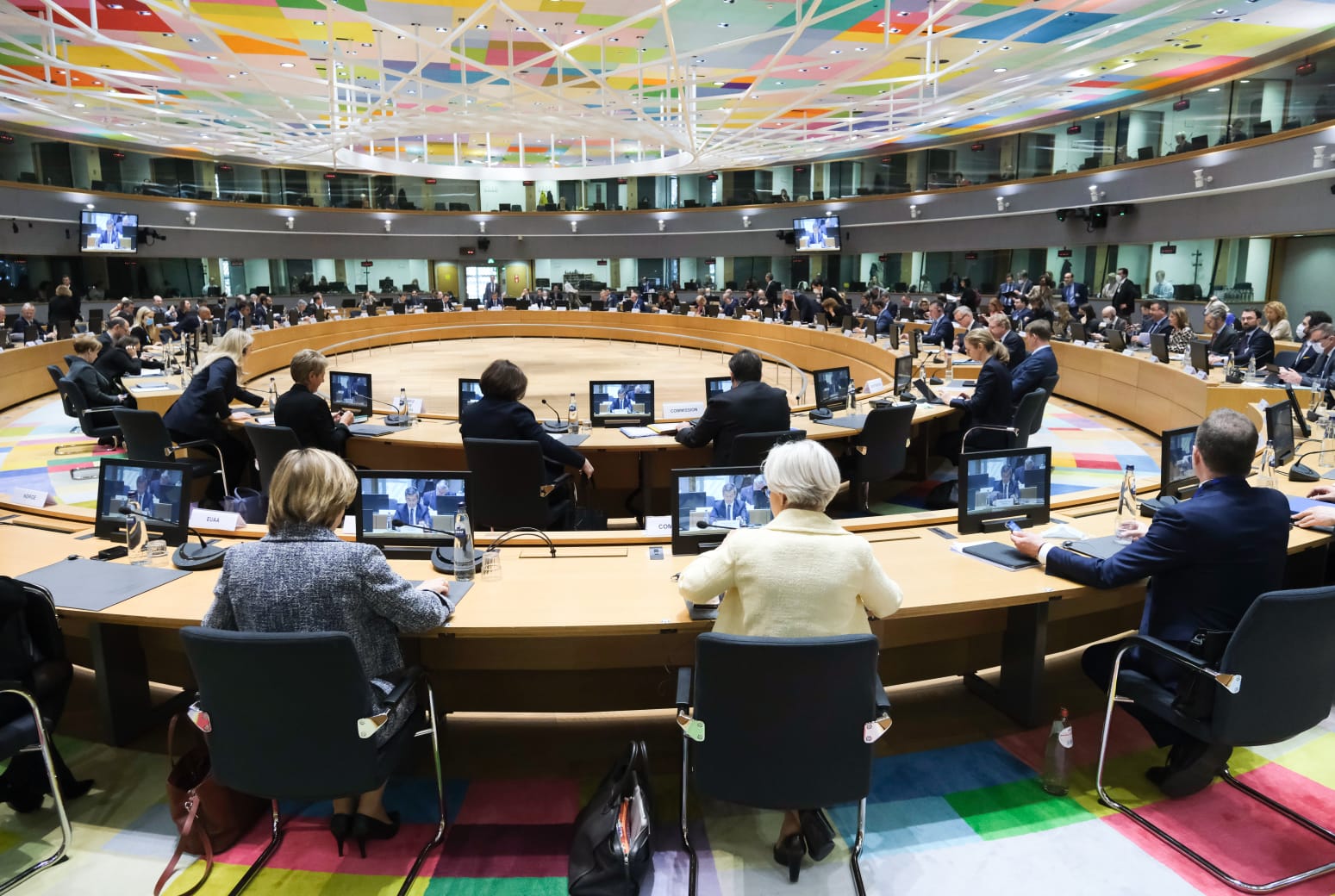
State Secretary Tibor Pogácsás highlighted that more than 530,000 people fleeing war have arrived in Hungary through our eastern borders, and we have been able to provide adequate assistance to them so far. The various authorities, aid organisations, local authorities and private individuals have been able to cope with the current situation, which has been praised by several international organisations. In order to carry out the tasks, instead of promises, adequate EU financial resources need to be made available to support Member States neighbouring Ukraine and bearing a significant burden. The protection of Hungary's external borders remains a priority for Hungary. To this end, we will comply with the requirements related to the registration and security screening of persons arriving at the external borders. We do not want the current situation to be exploited to open an illegal migration corridor to the European Union.
Hungary provides all health assistance to war refugees from Ukraine – EPSCO Health Council meeting, 29 March 2022
The EPSCO Council of Health Ministers took place on 29 March 2022 in Brussels. On behalf of Hungary, Prof. Dr. Ildikó Horváth Secretary of State for Health attended the meeting.
The Ministers took stock of healthcare related tasks concerning the war in Ukraine, including direct aid for the country and the full-scale healthcare provision for the refugees.
Ildikó Horváth confirmed that significant capacities have been reserved in the Hungarian health system to provide care for everyone in need. We are prepared to receive and care for refugees, both in terms of hospital capacity and in primary and chronic care, having special regard to oncology as well. In addition to helping refugees arriving at our country (e.g. enhancing entering points/immigration authorities for better entrance, transport - Hungarian Railway Company services with free tickets, buses as well -, reception/accommodation facilities etc.), Hungary considers it important to provide direct help to Ukraine as well. Therefore, under the EU Civil Protection Mechanism, the Hungarian Government has sent medicines, medical and special surgical equipment and further medical countermeasures besides the thousands of tons of food and hygienic products, fuel etc. Furthermore, under the rescEU programme, Hungary delivered ventilators, monitors and infusion pumps to Ukraine and Moldova. The Hungary Helps programme is also active in organizing and providing bilateral aid.
Besides the Ukraine situation, ministers had exchange of views on the future steps of the European Covid-19 vaccination strategy, particularly support provided to third countries. During the working lunch, heads of delegations/ministers discussed possibilities of deepening the European Health Union in the field of rare diseases.
V4 conference on sustainable and smart mobility solutions
In the framework of the Hungarian V4 Presidency the Permanent Representation of Hungary to the EU organized a half-day conference on sustainable and smart mobility solutions in the V4 countries. At the conference we have showcased several solutions, incentives and initiatives from the region which aims at reducing greenhouse gas emissions in the transport sector in line with the European legislation.
In his opening speech Gábor Baranyai Deputy Permanent Representative emphasised that V4 countries have made serious efforts in the field of green mobility which are hardly known therefore our aim is to present these efforts in Brussels.
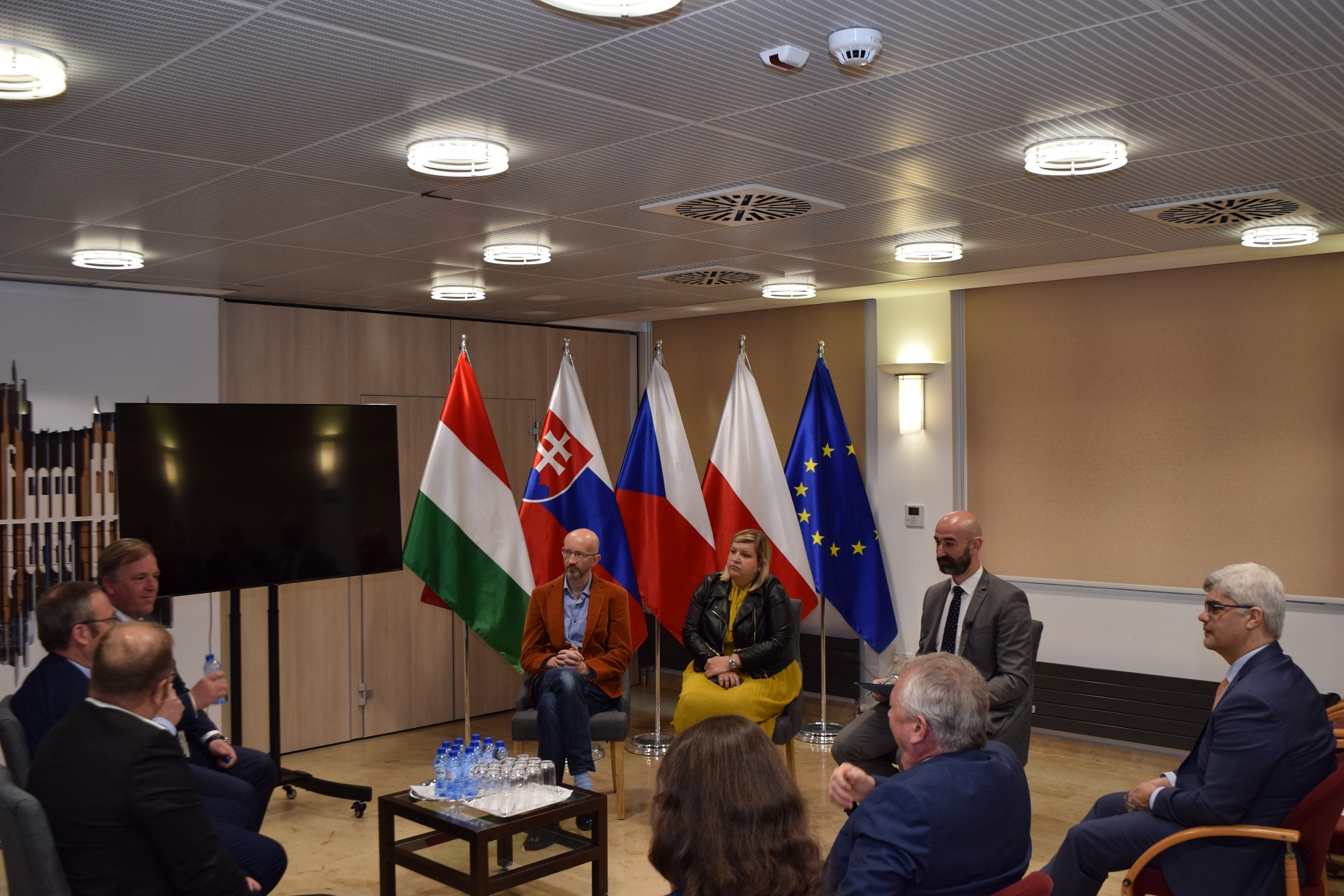
Dr. Péter Kaderják, head of Zero Carbon Hub (Budapest) in his keynote speech underlined that Hungary invested significantly in the decarbonisation of the transport sector: railway development, support scheme for the greening of the public transport, incentives for purchasing electric vehicles etc. Automotive sector contributes greatly to the Hungarian economy. Due to the huge investments in the battery production which been made recently, Hungary is in a favourable position with regard to the green transition of the mobility sector.
Joaquim Nunes de Almeida Director of the European Commission responsible for mobility and energy intensive industries (DG GROW) presented the Commission’s initiatives and legislative proposals in this field. He praised the developed automotive industry of the region and the extended battery supply chain established in Hungary in Poland. Mr Nunes de Almeida emphasised that the green transition needs to be fair as well therefore reskilling of the workers in the automotive industry is pivotal.
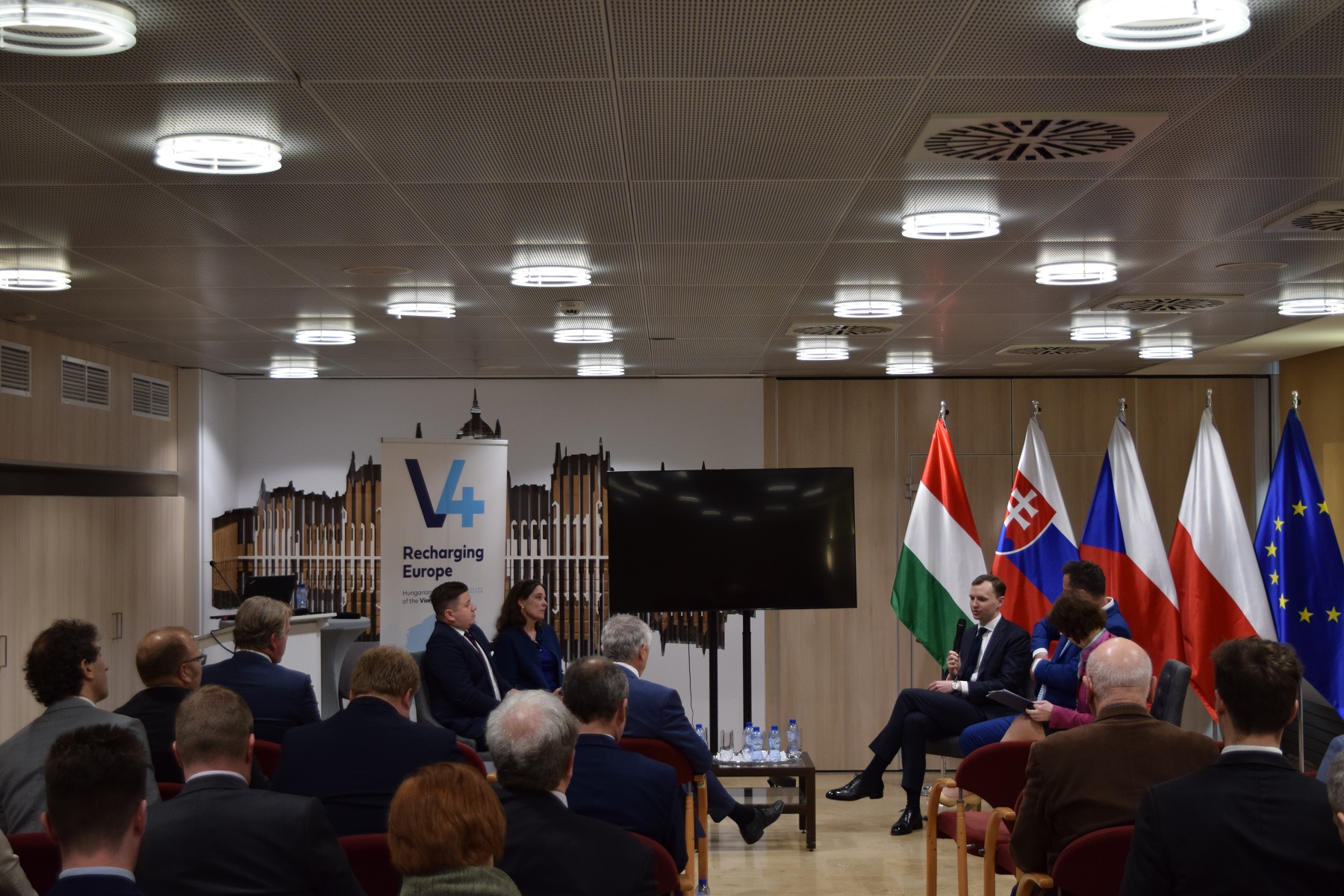
Among the showcases Veronika Erős, project leader of the Green Bus Program (Hungary) shared the experiences of the program. Radek Čech Director of International Relations Department of the Czech Railway Infrastructure Manager presented the Czech plans for high speed railway development. Péter Simon (Hungary) introduced the ecosystem being built around the Zala Zone autonomous testbed which provides an opportunity for developing and testing solutions in the field of electomobility as well. Johan Eidhagen from Wizzair gave an overview on the company’s effort in order to reduce greenhouse gas emissions.
During the panel discussions the panellists agreed that the different transport modalities do not compete with each other. Intelligent transport solutions can help the passengers to choose the best combination of transportation which leads to decreased emissions.
In the second session showcases focused on enabling technologies. Krzysztof Burda, President of Polish Chamber for E-Mobility Development presented their efforts on promoting electromobility in Poland.
Agevolt is a startup from Slovakia which invented intelligent chargers for e-vehicles. Jozef Ťapajna co-funder explained that price and availability of the chargers as well as the length of the charging hinder the penetration of e-vehicles in Slovakia. Their products provide solution for these problems.
Aleksander Naumann from Hydrogen Poland Association gave an overview on the Polish endeavours in the field of development of hydrogen technology.
During the panel discussions participants agreed that technological neutrality can enhance the success of green transition and can reduce negative socio-economic consequences.
The presentations of the conference are available at the website of the Permanent Representation clicking here.
V4 conference on sustainable and smart mobility solutions - presentations
AgeVolt - New age of e-mobility
Greening of the public transport in Hungary - Green Bus Programme in Hungary
High-speed railway development in the Visegrad countries
Sustainable Mobility in the Visegrad Countries - Objectives and Challenges in the Region
Electromobility in Poland - Ecosystem for electromobility developing, impact factors
Supporting Ecosystem for the Development of New Generation Vehicles
ECOFIN meeting - 5 April 2022
The ECOFIN meeting of April 5 was dominated by the situation in Ukraine. The ministers exchanged views on the economic and financial impact of the war and discussed the possible measures to take in order to mitigatate the negative impacts. Serhii Marchenko, Minister of Finance of Ukraine joined part of meeting online, and outlined the economic consequences of the russian agression. In the context of the implementation of the European financial architecture for development, the EBRD and the EIB gave an overview of their ongoing and prospective financial support initiatives to support Ukraine. Another important point on the ministers’ agenda was the directive on ensuring a global minimum level of taxation for multinational groups in the Union, but consensus could not be reached yet on this dossier.
Food security was the main focus at the April Agrifish Council
Agriculture ministers exchanged views on the communication about safeguarding food security, on agri-food market situation, on the revision of LULUCF regulation, Geographical Indications (GIs) during the Agriculture and Fisheries Council, held on the 7th of April in Luxembourg.
Ministers discussed the Commission communication on safeguarding food security and reinforcing the resilience of food systems. Hungary agreed with the Communication, that food security in the EU is not in danger, therefore the main task at European level should be to avoid the further increase of food prices and to strengthen the resilience of EU food systems.
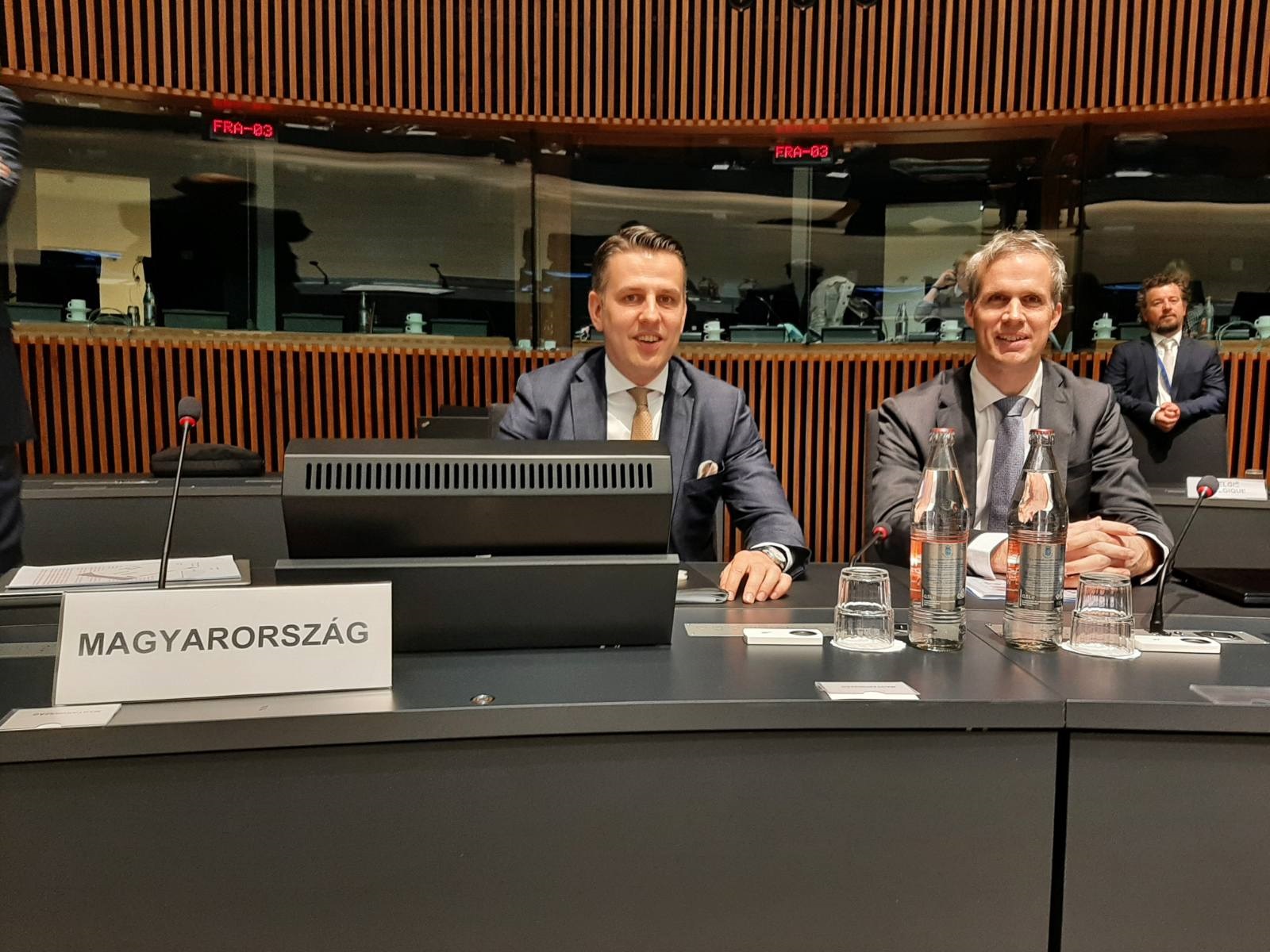
As regards the market situation in the wake of the Russian invasion of Ukraine, agriculture ministers expressed their solidarity to the newly appointed Ukrainian minister Mykola Solsky, who participated online during this debate. Most highlighted the food security as key priority and broadly welcomed the crisis response measures by the Commission. Ministers confirmed the ability of the Union’s agricultural sector to cover the Union’s food consumption needs.
As part of the Fit for 55 package, ministers discussed the ongoing revision of the LULUCF regulation. Hungary is committed to climate protection goals, but stressed the need to strike the right balance between the ambitious targets and the competitiveness of agriculture and to avoid any disproportionate burden on farmers.
Further topics included the proposal on the revision of the Geographical Indications presented by the Commission, the possible vaccination against highly pathogenic avian influenza and the flexible use of unused rural development funds.
General Affairs Council, 12 April 2022, Luxembourg
At the General Affairs Council meeting on 12 April 2022, Hungary was represented by Minister Judit Varga. The Council was chaired by Clément Beaune, French State Secretary for EU Affairs, and the Commission was represented by Vice-President Maroš Šefčovič and Commissioner Didier Reynders.
Annual rule of law dialogue: country-specific discussion
In the framework of the annual rule of law dialogue, Ministers held a country-specific discussion on the rule of law situation in the following five Member States: Luxemburg, Hungary, Malta, the Netherlands and Austria. During the session on Hungary Minister Judit Varga presented the Hungarian position on the Commission’s annual rule of law report, as well as replied to the questions and comments of some other Member States.
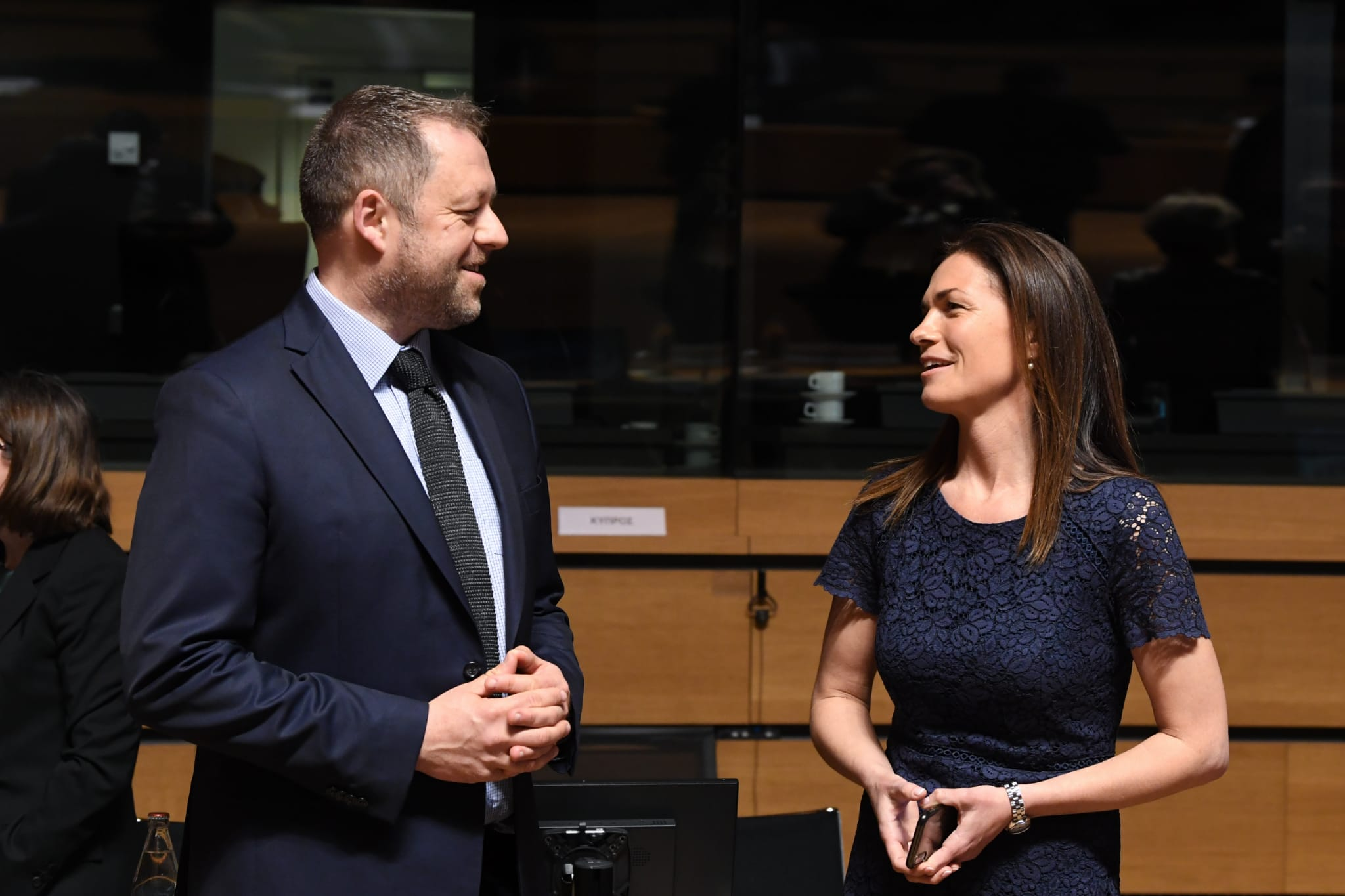
Conference on the future of Europe
The Council exchanged views on the next steps regarding the Conference on the Future of Europe. Ministers reacted to the draft proposals resulting from the exchanges with citizens. The conference participants will have to come to a consensus on the consolidated version of the proposals at the plenary meeting on 29 and 30 April, before citizens give their final opinion. The final report of the Conference on the Future of Europe will be submitted to the Presidents of the European Parliament, the European Commission and the Council in Strasbourg on 9 May. It will be for the institutions of the European Union, after 9 May 2022, to examine how to follow up on the conclusions of the Conference on the Future of Europe and to report to citizens on this work.
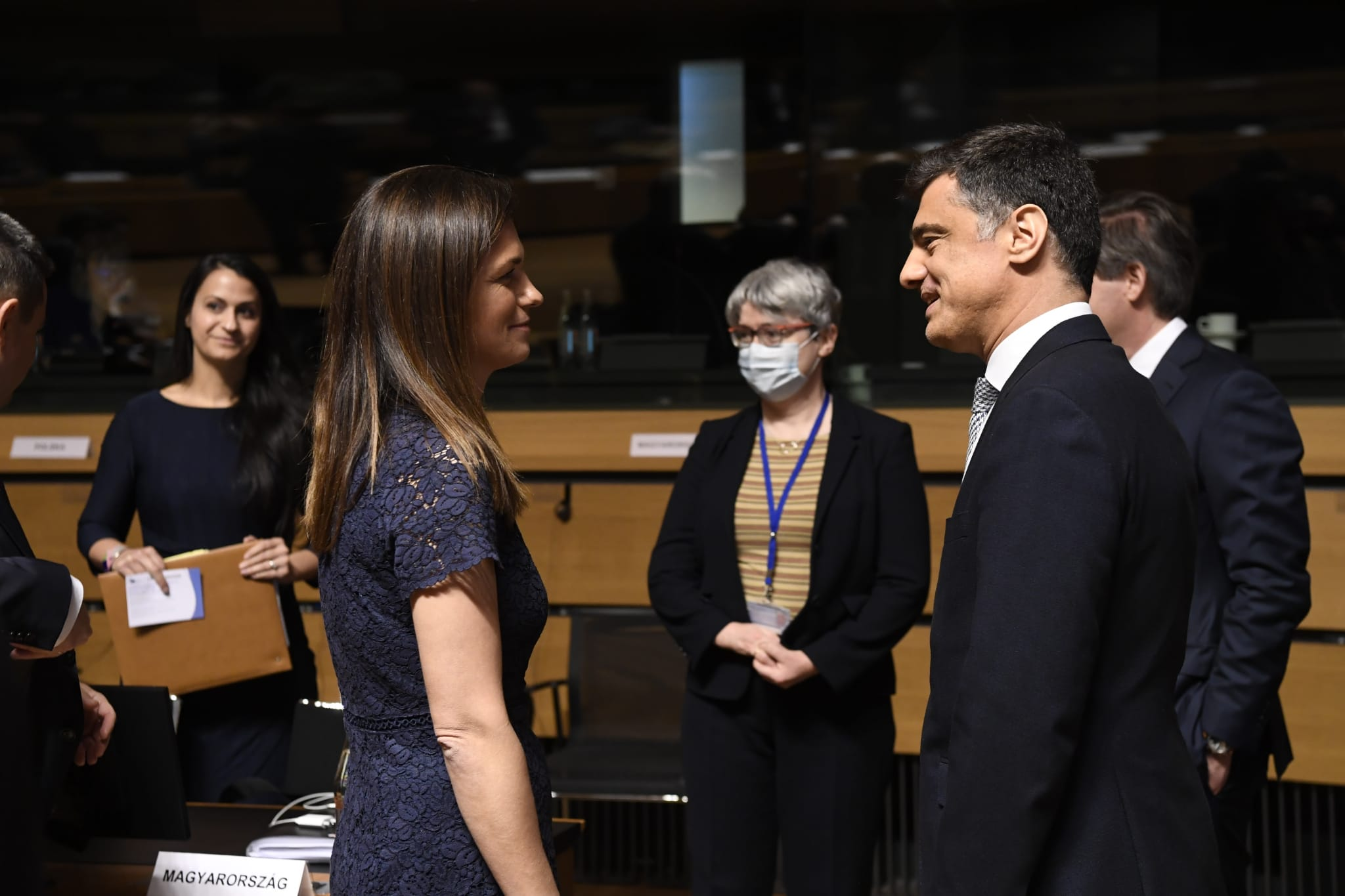
*
At an informal working lunch in the margins of the General Affairs Council, the "ministers of the future" exchanged views on the twin transition.
Extraordinary Energy Council meeting - 2 May 2022
At the extraordinary Energy Council meeting on 2 May 2022, ministers discussed the state of EU energy policy and the necessary preparedness measures in the context of the war in Ukraine.
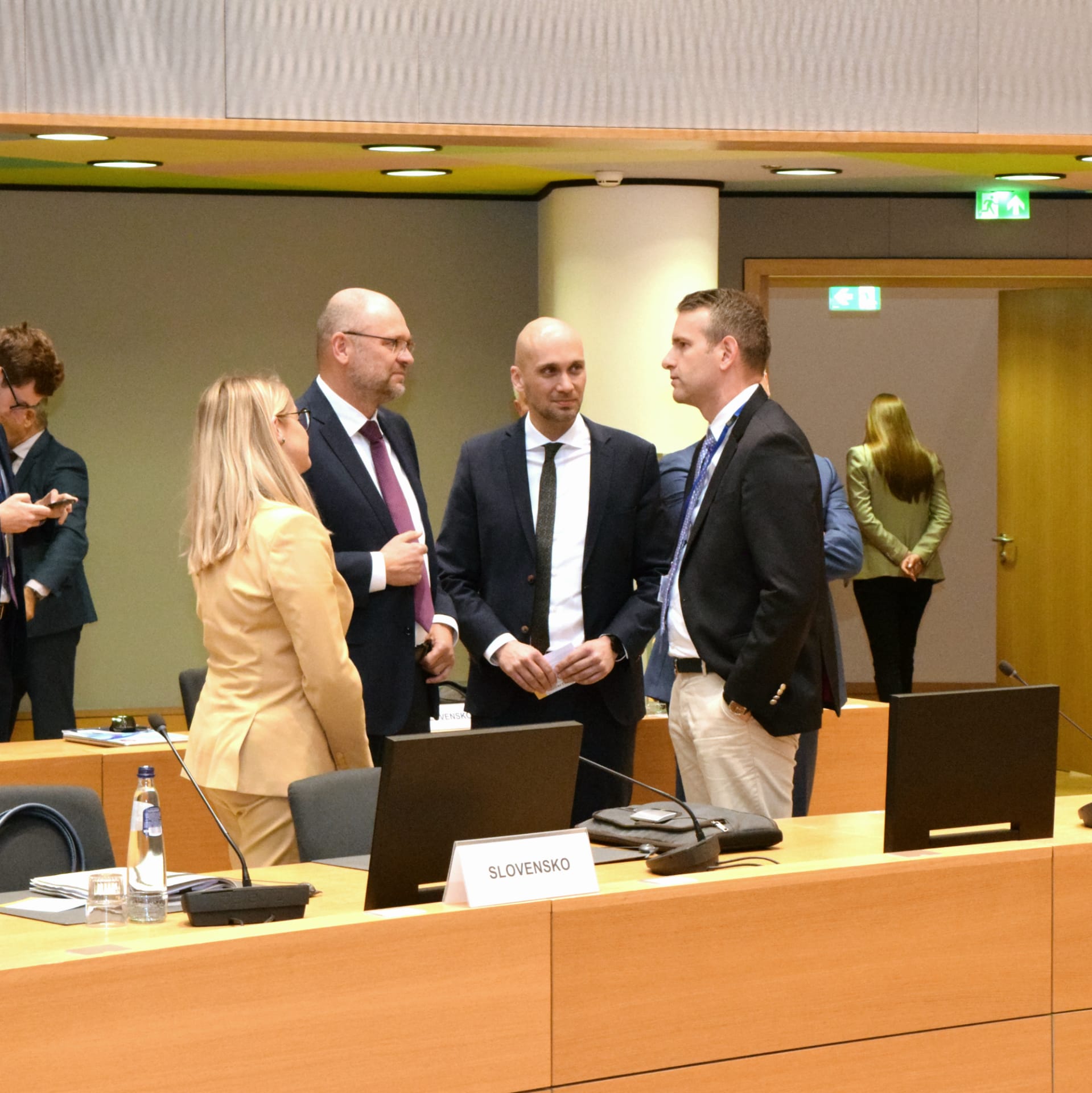
Member States underlined the importance of unity and solidarity and assured that they were also prepared for possible supply disruptions through enhanced cooperation. Hungary was represented at the meeting by Secretary of State Attila Steiner, who said, among other things, that Hungary supports joint EU action, but the specificities of the Member States must be carefully considered in all decisions. Hungary has made significant efforts and investments in recent years in order to strengthen its security of energy supply and is working to ensure security of energy supply in the future.
Economic and Financial Affairs Council - Brussels, 24 May 2022
At the ECOFIN meeting on 24 May, ministers had extensive discussion on the current economic situation.The debate was based on the Commission’s most recent economic forecast. There was a consensus that the most important task for the upcoming period is to keep inflation in check.
Another important topic of the meeting was the question of providing further financial assistance to Ukraine. Ministers welcomed the proposal for new macroeconomic financial assistance to Ukraine and examined the implementation of sanctions against Russia, including their economic és financial consequences.
Moreover, ministers held an exchange of views on the state of play regarding the implementation of the RRF, where they focused on the amendment of the RRF Regulation related to the REPowerEU plan.
As an information point, the ECOFIN was briefed on the outcome of the last G20 meeting of finance ministers and central bank governors, on the state of play of the current legislative proposals in the field of financial services, and finally on the challenges facing the Customs Union.
Market situation was the main focus at the Agrifish Council in May
Agriculture ministers exchanged views on agri-food market situation including the Solidarity Lanes, G7 Agri Ministers meeting and the 12th WTO ministerial meeting. The Ministers also adopted Council Conclusions on avian influenza vaccination on the 24th of May in Brussels.
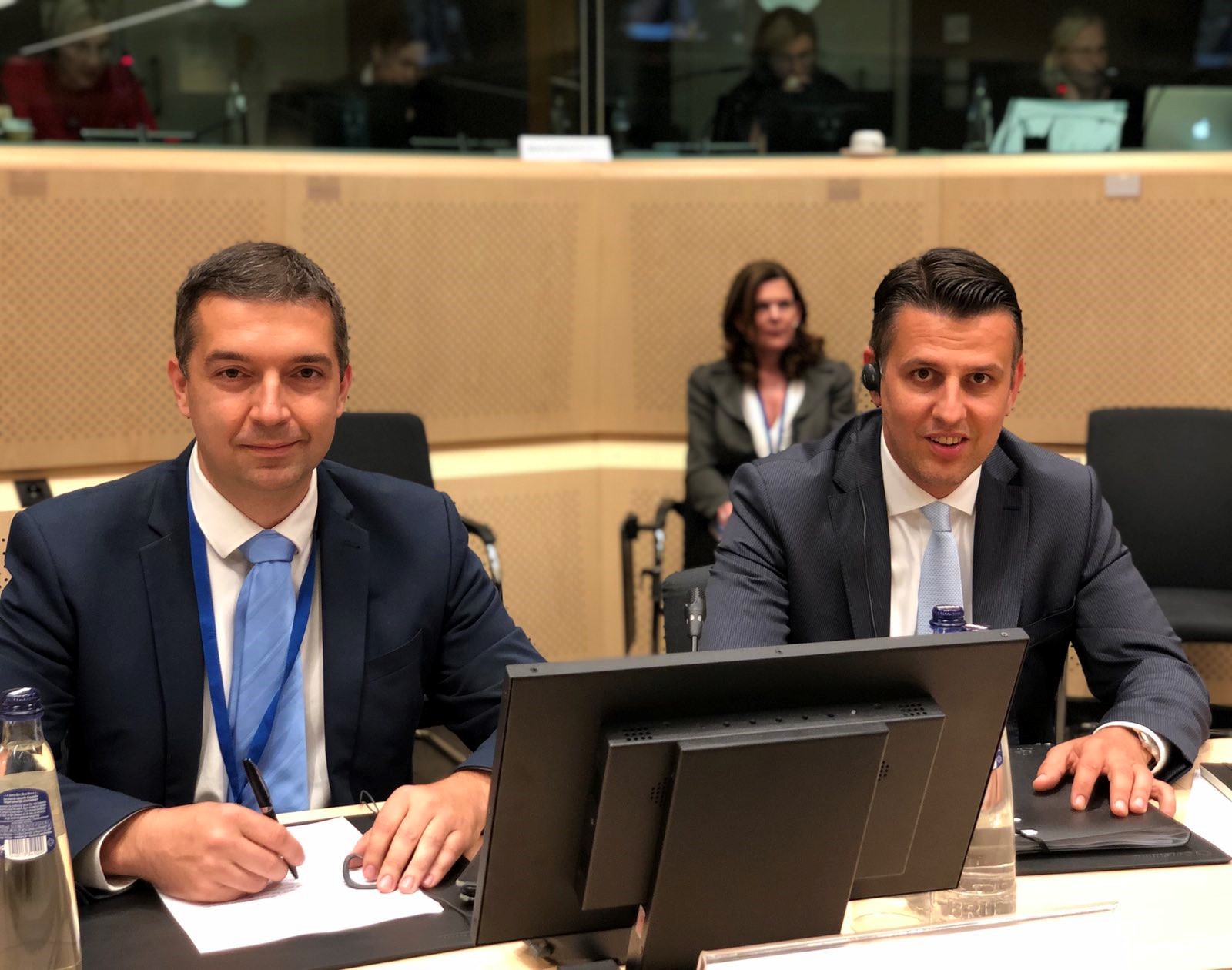
As regards the market situation in the wake of the Russian invasion of Ukraine, Ministers still highlighted the food security as key priority and broadly confirmed the ability of the Union’s agricultural sector to cover the Union’s food consumption needs. Mr Zsolt Feldman State Secretary recalled that the EU is net exporter of agricultural products and it is our common responsibility to help third countries. In order to reach that, the EU has to produce more, therefore, the swift adoption of the CAP strategic plans is highly necessary. Commission presented its communication on EU-Ukraine Solidarity Lanes to facilitate Ukraine’s agricultural export. Mr Feldman highlighted that it is of utmost importance to stabilise agricultural production in the region. Hungary, as a neighbouring country will help Ukraine export its grain products through our country. Hungary is committed to effectively cooperate on the execution of the actions proposed in the communication.
Ministers adopted Council Conclusions on vaccination possibilities against avian influenza. They shared the importance of vaccination as a possible complementary tool to currently available preventive and control measures. Hungary fully supports the conclusions and considers it particularly important to pay attention to the commercial challenges.
Ministers were briefed on the preparation for the 12th WTO Ministerial Conference taking place in Geneva next month and also on the G7 Ministerial that took place in Stuttgart on May 13-14.
Further topics were also discussed such as soil protection, keeping of wild animal species as pets, phytosanitary issues and the additional support measures to provide liquidity aid to farmers financed out of the EAFRD.
General Affairs Council, 23 May 2022, Brussels
At the General Affairs Council meeting on 23 May 2022, Hungary was represented by Minister Judit Varga. In the absence of Clément Beaune, French State Secretary for EU Affairs, the Council was chaired by Mikuláš Bek, Czech Minister for EU Affairs, and the Commission was represented by Vice-Presidents Dubravka Šuica, Vera Jourová and Maroš Šefčovič, and Commissioner Didier Reynders.
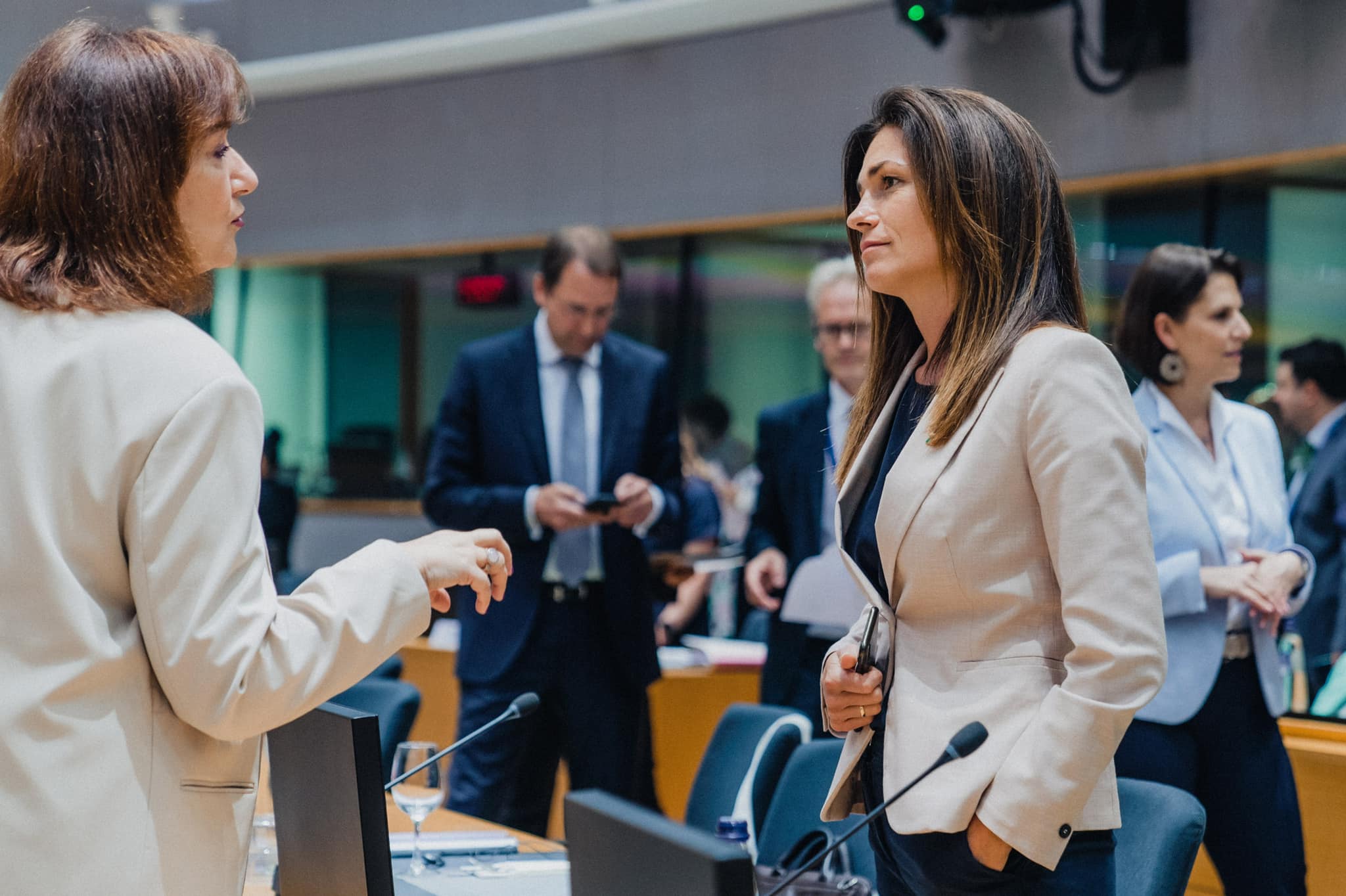
Photo credit: Facebook/Varga Judit
Special European Council meeting on 30-31 May 2022
The General Affairs Council held an exchange of views about the preparation of the upcoming special European Council meeting on the 30th and 31st of May based on the draft conclusions. The Ministers focused the discussion on Ukraine, defence, energy and food security.
European Council meeting on 23-24 June 2022
The General Affairs Council held an exchange of views about the preparation of the European Council meeting on the 23rd and 24th of June based on the annotated draft agenda. The Ministers focused the discussion on Ukraine, economic issues, the Conference of the future of Europe and the European Union’s relations with its partners in Europe.
Conference on the future of Europe
On 9 May 2022, the final report on the Conference was delivered to the three co-presidents. The report presents 49 proposals broken down into 326 measures. During an informal working lunch on the margins of the General Affairs Council on 23 May, ministers discussed the conclusions of the conference and the methodology for following up the proposals. The Council may return to the discussion of the proposals at the General Affairs Council on 21 June 2022 on the basis of a document to be prepared by the General Secretariat of the Council analysing possible ways of implementing the proposals (https://futureu.europa.eu/pages/reporting?locale=hu).
Values of the Union in Hungary
The Council held a hearing on the rule of law in Hungary (Article 7 (1) TEU procedure), conducted pursuant to the standard rules approved by the Council in 2019.
Justice Minister: Important to continue “constructive dialogue” with EU
Justice Minister Judit Varga said she would pay an official visit to Brussels probably in June, and have talks with justice commissioner Didier Reynders.

Photo credit: Facebook/Varga Judit
The justice minister said it is important to continue a “constructive dialogue” with the European Union.
Following a meeting of EU affairs ministers in Brussels on Monday, Justice Minister Judit Varga told MTI that she would pay an official visit to Brussels probably in June, and have talks with justice commissioner Didier Reynders. She said she would call the European Commission’s attention “to the fact that the Hungarian government has met a number of expectations but the Commission communicates as if those actions had not been taken”. For example, she mentioned legislation concerning the transparency of civil organisations and addressed the problem in line with the Commission’s expectations. “The case must be closed, Hungary has done what it was expected to do,” she said, but added that the law continued to aim to ensure transparency of civil organisations “using large resources and having great influence on public affairs”.
Concerning her hearing held as part of an Article 7 procedure concerning the rule of law in Hungary earlier in the day, Minister Varga said it was like “parallel monologues” rather than a real dialogue, which she said had proved that “it is a political procedure with nothing to do with the rule of law”. “We have no more to do in this procedure than to meet the expectations of the Hungarian people; our voters have made a choice concerning Hungary’s EU policy, and decided that the government should protect borders, families, and national sovereignty,” she insisted. Concerning the rule of law mechanism, Varga said the Commission had asked the Hungarian government to provide information; “it is a misconception that they are aiming at sanctions or cutting funds”. “The position is that at the end of the procedure they could cut resources we have not even been granted,” she said. Communication between the government and the Commission is uninterrupted but “there are red lines that voters have drawn such as the child protection law and the security of energy supplies; those lines must not be crossed”, she said.
On another subject, Minister Varga said that in the series of conferences concerning the future of Europe some 2,600 proposals had been raised, which “reflect that Hungarians wish to return to a Europe respecting national competencies, if necessary, even through amending the EU treaties”. “This direction may not be attractive to the federalists, but it is a legitimate position,” she said, adding that the opposite view would not serve the interests of nation states and smaller members. Meanwhile, the minister said the EU’s economic recovery mechanism may not address challenges around energy supplies, creating “structural challenges in countries without a seaside due to sanctions against Russian energy imports”.
Source: abouthungary.hu
PM Orbán proposes leaving EU’s latest sanctions package against Russia off agenda at EC meeting
The prime minister said that if approved, the sanctions would immediately cause severe disruptions to Hungary’s energy supply, undermining the country’s energy security interests.
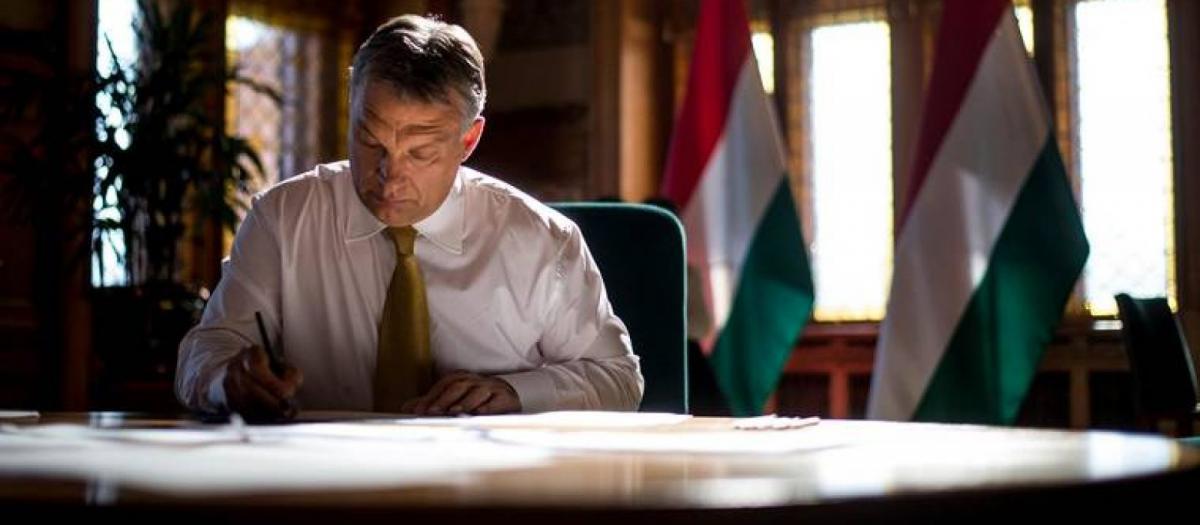
Photo credit: Facebook/Orbán Viktor
In a letter to European Council President Charles Michel, Prime Minister Viktor Orbán has proposed leaving the European Union’s latest sanctions package against Russia off the agenda at a meeting of the council to be held at the end of the month. PM Orbán said in his letter that if approved, the sanctions would immediately cause severe disruptions to Hungary’s energy supply, undermining the country’s energy security interests. PM Orbán said the sanctions would cause a 55-60 percent increase in fuel prices at a time when energy prices are already at a 40-year high. Neither Hungarian households nor the Hungarian economy can withstand such a price shock, he added.
According to MTI, the prime minister said Hungary is still heavily dependent on Russian energy imports despite the fact that large-scale investment projects aimed at diversifying the country’s energy sources and routes have led to a decrease in Russia’s share in Hungary’s supplies from over 90 percent in 2010 to 64 percent in 2021. “Due to our geographical situation, phasing out Russian oil for Hungary is not possible without a complete rearrangement of our refinery capacities also requiring increased and accelerated investments in our energy infrastructure and a speedy green transition,” Orbán said. He warned, at the same time, that since most of those investments could not be financed on the basis of the market, the sanctions would require diverting national resources to redundant fossil investments “while relevant funding from the European Union for us is only available on paper”.
The prime minister said that though there had been encouraging signs from the European Commission that the REPowerEU Plan would provide a satisfactory solution to the problems facing the bloc, “the plan presented on May 18 fails to specifically and comprehensively address the serious concerns we have raised”. He said that according to the Hungarian government’s interpretation, one of the main objectives of the REPowerEU Plan should be to rapidly reduce the EU’s dependence on Russian fossil fuels. As regards the security of oil supply, the plan does cover the modernisation of petroleum product refineries, the expansion of the capacity of the existing infrastructure and the tackling of existing bottlenecks, the prime minister said. He added, however, that the plan did not set a financial framework for landlocked member states. Neither does it provide any guidance for the methodology and schedule for the financing of the urgent investment needs related to replacing Russian oil, Orbán said.
The prime minister also said the REPowerEU Plan did not take into consideration member states’ different energy needs stemming from their different energy mixes. “We believe that it is crucial to clearly distinguish short-term investment needs related to the reduction of Russian energy dependency from the longer-term transition to renewable energies,” PM Orbán said. He emphasised that this was crucial for member states like Hungary, arguing that “the two cannot be achieved at the same time without putting our energy security at serious risk”.
Transport Council, 2 June 2022, Luxembourg
The Council of Transport Ministers took place on 2 June 2022 in Luxembourg. On behalf of Hungary, Ambassador Gábor Baranyai attended the meeting. The Council adopted general approaches on the legislative proposals of the Fit for 55 package that relate to transport.
These proposals will play a significant role in the EU’s efforts to cut its transport emissions by 90%, a prerequisite for meeting the 2050 climate neutrality.
The Council started its meeting by adopting a general approach on the draft regulation on the deployment of alternative fuels infrastructure (“AFIR”). Subsequently, the Council adopted its general approach on a proposal aimed at ensuring a level playing field for a sustainable air transport sector (“ReFuelEU Aviation”). The Council then unanimously adopted its general approach on a proposal to promote the use of renewable and low-carbon fuels in maritime transport (“FuelEU Maritime”).
Based on a progress report, ministers held an exchange of views on the draft regulation on the development of the trans-European transport network (TEN-T).
Over lunch, ministers exchanged views on Ukraine's situation to provide a co-ordinated response in the field of transport to Russia’s war of aggression against Ukraine.
General Affairs Council, Cohesion - 02 June 2022, Luxembourg
Mr. Tibor Navracsics, Minister responsible for Cohesion Policy, attended the General Affairs Council dedicated to Cohesion Policy on 2nd June in Luxembourg. The Council adopted the Council Conclusions about the 8th Cohesion Report and held a discussion about the role of the territorial approach in enhancing convergence.
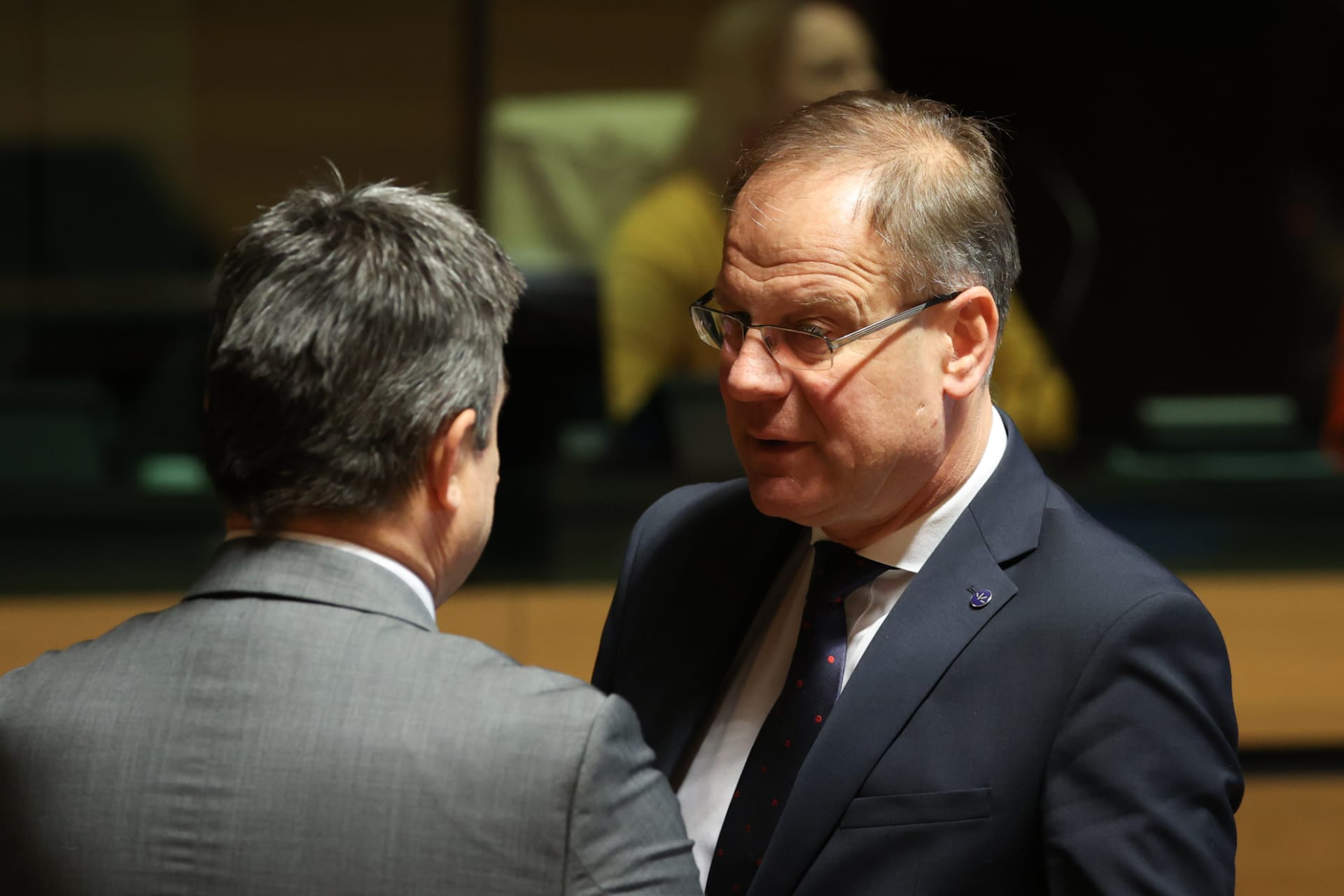
By adopting the Council Conclusions the Ministers took note of the significant developments of the last decade: economic and social cohesion at Union level has improved, but convergence has been mainly due to the relatively strong growth in many less developed regions, while some middle income regions are stagnating. Progress has also been made in improving employment, but regional disparities remain larger than before the 2008 financial crisis. Moreover, gaps between and within certain regions remain and are sometimes even widening, and some regions seem to be caught in a development trap. The Ministers underlined that Cohesion Policy is one of the most important tools in fostering development in less developed regions, as well as a major investment policy of the EU, which should continue supporting investments necessary for convergence and to avoid development traps for all regions. The Ministers also highlighted that in the long run the policy gives rise to benefits for all regions.
During the debate the Ministers underlined that Cohesion Policy is not a crisis instrument; however, it has helped regions in mitigating the effects of the recent crises. Some Member States, including Hungary called for a more flexible implementation approach, i.e. the Policy needs to be able to adapt to new developments, without harming its structural and long-term objectives. This also means, that the Policy can only be successful if it takes into account local development needs and supports regions in their tailor-made development strategies.
Meeting of the Telecom Council, 3 June 2022
The Telecom Council of 3 June reviewed progress on the Regulation laying down harmonised rules on Artificial Intelligence, the Regulation on the framework for a European Digital Identity and the Data Act Regulation.
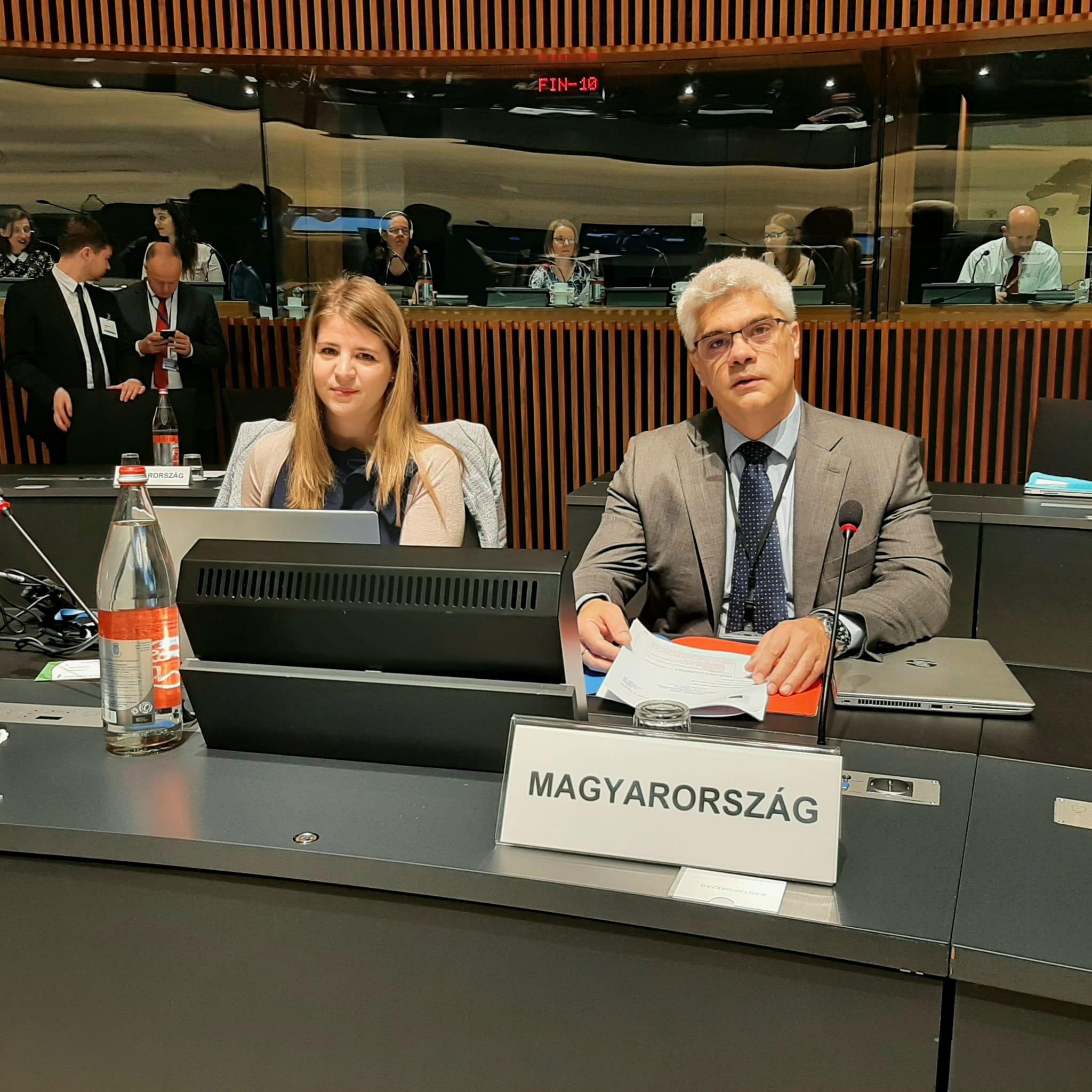
Several ministers welcomed the work of the French Presidency, stressing the need to ensure that future legislation does not hamper innovation and is properly fits into the existing EU legislative environment.
The Presidency also briefed ministers on negotiations with the European Parliament on the ePrivacy Regulation. As regards the Decision on the Path to the Digital Decade the Presidency declared that the trilogue negotiations would start soon. An update was also shared on the negotiations on the preliminary political agreement reached at the trilogue on the Directive on measures to ensure a high level of cybersecurity across the EU. Ministers were updated regarding the developments of the negotiations regarding the European Declaration on Digital Rights and Principles for the Digital Decade and the preparations concerning the upcoming Plenipotentiary Conference of the International Telecommunication Union.
Ministers held an exchange of views on the digital and green transition, focusing on the methodology for measuring carbon emissions from digital technologies and setting targets for reductions by 2030. They stressed the need for this methodology to be scientifically sound and consistent and proposed various measures to increase the energy efficiency of the digital sector.
Hungary stressed that digital technologies are key to achieving environmental goals, and that all sectors, including the ICT sector itself, need to reduce their ecological footprint. This should be developed taking into account the whole value chain. Hungary also supports the circular electronics initiative, which ensures that devices are designed for durability, maintenance, dismantling, reuse and recycling and including a right to repair or upgrade to extend the lifecycle of electronic devices and to avoid premature obsolescence
